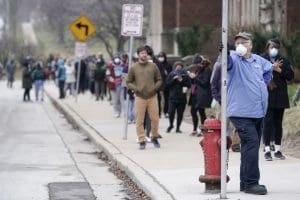Republicans force Wisconsin voters to risk their lives during a pandemic
Scholars and other observers say Republicans in the state want to keep voter turnout low to boost their chances in a key state Supreme Court election.

Voters in Wisconsin are putting their health at risk on Tuesday to cast ballots in the state’s election, after the Republican-controlled state Legislature and the conservative majority on the state Supreme Court blocked Democrats’ attempts to postpone it.
Observers who study elections say the reason Republicans blocked the postponement is clear: They believe conducting it as scheduled and keeping Election Day turnout low will help the GOP keep a state Supreme Court seat it is defending on Tuesday.
Wisconsin Gov. Tony Evers issued a stay-at-home order for state residents on March 24 as the coronavirus pandemic continued to spread.
The court currently has a 5-2 conservative majority. Democrats are seeking to flip the seat held by Republican Justice Dan Kelly.
The winner of Tuesday’s state Supreme Court race will serve a 10-year term.
“The whole election could have been postponed to let more people vote by mail if the Wisconsin Supreme Court or the Wisconsin legislature had allowed it,” Michael McDonald, a professor at the University of Florida who studies elections and voter turnout, tweeted Tuesday morning. “The Republicans who control these bodies calculate that they will win a state Supreme Court election with this disgrace.”
Control of the state Supreme Court would have broad implications for the 2020 election and beyond.
The court is currently weighing whether to hear an appeal from a conservative law firm of a judge’s order preventing the purge of more than 200,000 voters from the state’s rolls ahead of the November election.
Those 200,000 voters are concentrated in Democratic strongholds in the state. Purging Democratic voters could help Republicans in what’s expected to be a competitive state in this fall’s presidential election. Donald Trump carried Wisconsin by just over 20,000 votes in 2016 — less than 1%.
Kelly had recused himself from an earlier hearing on the purge, leading to a deadlocked 3-3 decision that blocked it from happening, according to the Associated Press. But if Kelly wins reelection, he might not recuse himself a second time, and the purge could be approved, as the Cap Times in Madison reported.
The state Supreme Court will also likely play a role in the 2020 redistricting process. Wisconsin has one of the most gerrymandered legislative and congressional maps in the country, with Republicans winning large majorities despite the fact that voters of both major parties are fairly evenly distributed throughout the state.
The editorial board of the Milwaukee Journal Sentinel says that Wisconsin state Speaker Robin Vos and state Senate Majority Leader Scott Fitzgerald believe low turnout on Election Day will help Kelly defeat his liberal challenger, Dane County Circuit Judge Jill Karofsky.
“Republicans have been concerned for months that the nominally nonpartisan race falls on the same day as the presidential primary, which was expected to attract a swarm of Democrats to the polls,” the board wrote in a piece published on Monday. “But with coronavirus dampening turnout, Kelly’s odds suddenly looked better — especially if in-person voting continued.”
Turnout is expected to be low on Tuesday, with voters afraid to go to the polls due to the coronavirus pandemic.
And those that do go to the polls will have a harder time finding a voting location, with many closed as poll workers refuse to show up. There have already been reports of long lines at polling places.
In Milwaukee, just five of the city’s typical 180 in-person voting locations are open. In the city of Waukesha, a Republican stronghold, there is just one voting location.
Wisconsin Democratic state Sen. Jon Erpenbach said that keeping Election Day turnout low, especially in Milwaukee, a Democratic stronghold, will help the Republican incumbent in the state Supreme Court race.
“Democrats have always been good about getting out the vote on the day of,” Erpenbach said. “If you’re looking at the newspapers, watching TV, you know right now it’s dangerous.”
Published with permission of The American Independent Foundation.
Recommended

Biden campaign launches new ad focused on Affordable Care Act
Former President Trump has said he wants to do away with the popular health care law.
By Kim Lyons, Pennsylvania Capital-Star - May 08, 2024
Ohio doctors fear effects of emergency abortion care case set to go before U.S. Supreme Court
A federal law that allows emergency departments to treat patients without regard to their ability to pay will be under U.S. Supreme Court scrutiny this week, and Ohio doctors are concerned about the case’s local impact on emergency abortion care.
By Susan Tebben, Ohio Capital Journal - April 23, 2024
House GOP votes to end flu, whooping cough vaccine rules for foster and adoptive families
A bill to eliminate flu and whooping cough vaccine requirements for adoptive and foster families caring for babies and medically fragile kids is heading to the governor’s desk.
By Anita Wadhwani, Tennessee Lookout - March 26, 2024












































































